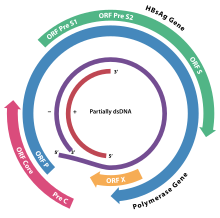乙型肝炎e抗原
(重定向自HBeAg)
乙型肝炎e抗原(英文:Hepatitis B e antigen),简称乙肝e抗原、HBeAg,是乙肝病毒的一种病毒蛋白,为病毒复制活跃程度的指标[1][2]。如果患者身上检测出乙型肝炎e抗原阳性,则较为可能传播乙肝病毒(如“大三阳”)[2][3]。


结构
编辑功能
编辑临床
编辑临床上,乙肝患者的血液检测中:e抗原阳性、e抗体阴性被称为“大三阳”,传染性较强,乙肝病毒在体内复制能力较强;e抗原阴性、e抗体阳性被称为“小三阳”,传染性较弱,乙肝病毒在体内复制能力较弱[3]。
参见
编辑参考文献
编辑- ^ 乙型肝炎. 世界卫生组织. 2021-07-27. (原始内容存档于2021-08-10) (中文).
- ^ 2.0 2.1 2.2 2.3 HEAG - Clinical: Hepatitis B e Antigen and Hepatitis B e Antibody, Serum. 梅奥医院. [2021-08-15]. (原始内容存档于2021-08-15) (英语).
- ^ 3.0 3.1 什么是「大三阳」 「小三阳」. 丁香园. 2015-12-18. (原始内容存档于2020-10-26) (中文).
- ^ TSRI - News and Publications. [2009-01-03].
- ^ Milich, David; Liang, T. Jake. Exploring the biological basis of hepatitis B e antigen in hepatitis B virus infection. Hepatology (Baltimore, Md.). 2003-11, 38 (5): 1075–1086 [2021-08-26]. ISSN 0270-9139. PMID 14578844. doi:10.1053/jhep.2003.50453. (原始内容存档于2022-04-26).
- ^ Mandell, Douglas, and Bennett's Principles and Practice of Infectious Diseases. 7th ed. page 2062